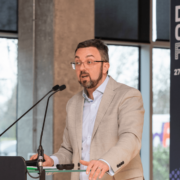2023 Agenda
Thursday 14th September

The UK continues to stand out internationally as regionally unbalanced. This panel will discuss the best practices in order to change that.
- How to make the best of ‘Levelling Up’ fund? An overview of government’s commitments to investments in the North.
- How can we level up without ‘levelling down’ other areas?
- How can digital infrastructure transform the lives of millions in the North of England and Scotland?
- How to facilitate fibre development in local communities?
- How can upskilling and reskilling initiatives help grow your local economy?




This talk is focused on the concept of “Smart Estates” and how it can deliver scalable and meaningful outcomes across the public estate. We will delve into the benefits, challenges, technologies, and strategies associated with building and managing intelligent, sustainable, and efficient government estates that cater to the needs of citizens and enhance operational efficiency.
In this session, we will explore:
- How rich data and actionable insight can enhance the citizen experience and provide improved services and amenities
- Address challenges such as security, integration complexity and initial investment and how to navigate them
- How to embrace innovation to create a more sustainable, efficient and citizen-centric government estate ecosystem for the UK.

The recent global disruption caused organizations to accelerate the transition to digital government. But the transition to digital government requires organizational change, and change in government can be difficult at any time – let alone today when ever more is demanded of less.
Government at all levels may feel like they’ve limped into the digital age. In spite of rapid technological advancements, it feels like the gap between the policy outcomes we intend and what we achieve are widening, not narrowing.
But it’s not simply more money or people that’s needed: options not readily available in this environment. Government is hamstrung by technology choices that make it even harder to close this digital aspiration gap. Goals morph unrecognisably as they cascade through solutions that are too complex to implement. But an approach is taking hold that can enable creative and courageous public servants to make a government that works for people.
Join this roundtable to hear what Squiz’s customer research revealed about how to embrace change through composability, and engage in a robust discussion with peers on how it can apply to your digital transformation programs.


Rochdale is the 15th most deprived borough in England with significant numbers of residents experiencing financial hardship. Steph, Vicky, Paul and Liz describe how they have worked together on an innovative project to provide free wifi for communities in Rochdale experiencing digital poverty. They talk about how the mesh network evolved as a co-operative response to address digital exclusion, providing at minimal cost Wi-Fi, equipment and skills training to those who are digitally excluded




Adam and Kerry are part of the Design Ops team in the Department for Education. They talk about how their team built Apply the Service Standard in DfE to help services teams to understand and apply the GOV.UK Service Standard to their work. Their service does not recreate the Service Standard but is there to support teams with practical examples to apply the 14 point service standard when working on DfE services.


Join us for an enlightening and thought-provoking session as Verint unveils the immense potential of Digital Communities in fostering social value for citizens. Throughout this engaging session, we will delve into the following key aspects:
- Why a Digital Community should be pivotal to your citizen engagement strategy.
- How ‘communities’ elevate citizen engagement – from messages to the masses, to moments that matter for the minority.
- How to overcome digital exclusion by leveraging Digital Communities to engage all citizens, regardless of their digital access.
- Five powerful ‘social value’ strategies that empower your Digital Community to drive economic, social, and environmental wellbeing for citizens.


- Learn transformation strategies and methodologies designed to make public services more efficient.
- How to enhance and utilise data quality decision-making.
- How transforming citizen experience can contribute to economic growth and innovation in the digital world.
- How automation can transform services for citizens.

How the South Australian Government is a great reference customer for startups to accelerate innovation and deliver modern public services via Go2Gov Innovation Challenge Program


A case study from Applied Innovation Center in Egypt.

- Making the decision to stick (not twist!)
- The value of good habits in lieu of a solid plan
- What to do when the goal posts keep on moving
- Managing risk
- Addressing technical debt

- Decommission obsolete applications – Eliminate costly legacy applications while complying with data retention, user access and stringent security requirements.
- Cost effectively transition to the cloud – Preserve business-complete data within a scalable archive that makes full use of native cloud storage.
- Manage operational costs for live applications – Optimise current application support infrastructure for in-process data while maintaining user access to historical data with active data archiving.

In this presentation we will review the key service areas where technology will deliver a huge impact on the delivery of public services over the next 12 months.
Assessing the core challenges being experienced, the specific innovations that are transforming service delivery and hearing from a range of real-world examples, we will explore the range of capabilities that are driving value across the delivery of frontline public services and highlighting the main service areas that must look to evolve.

- How does PCX move the needle
- The four pillars of PCX
- Business Impact
- How can you deliver on this

- What are best practices of information sharing and communication between local authorities and wider public sector when dealing with similar issues?
- How to further facilitate the exchange of ideas between local authorities? What formal structures are required for collaboration?
- How can we improve data sharing between different parts of the public sector?
- How do we work strategically with suppliers, leverage assets and buy collectively to avoid duplication
- Collaborative approaches to innovation involving partnerships with the private sector, academia, and non-profit organisations.

Greater Manchester – Doing Digital Differently.



- How to address the people element of digital change?
- How can we approach changing the mindset and culture to digital-first thinking?
- How to help users acclimate to the rapidly evolving technologies and new ways of conducting business?
- How to engage busy staff with low digital skills in digital transformation and how to help them understand the real value of it?
- How to create a world leading, sustainable digital workforce: upskilling, re-skilling and recruitment.

Digital Citizen Division comprises the Connecting Scotland, Digital Ethics, Data ethics, Unlocking the Value of Data and Knowledge and Information Shared Services teams. Join DCD’s Eilidh Mclaughlin as she walks us through the ins and outs of this unique team in the Scottish Government.

The public sector is spending more and more on ICT procurement every year. What does this expanding market look like in the North of England?
In this presentation, Gus Tugendhat, founder of Tussell, will use data on public contracts and spending to analyse the state of the public ICT market in the North of England, including:
- Unpacking the market’s size and trajectory between FY 2018/19 and FY 2022/23
- Revealing the region’s top ICT spenders across Local Government and the NHS, and their biggest suppliers
- Showing how you can be harnessing this data to make smarter and more cost-effective procurement decisions

Navigating government services shouldn’t be a puzzle! In this session, we will dive into how combining centralised Knowledge Management and the smarts of GPT technology can make citizen engagement a breeze—safely and securely, of course.

Local governments struggle to close the budget gap while continuing to deliver high class services through digital transformations
- How to improve the integration of digital with policymaking?
- Why should a strong business case be at the heart of transformations?
- How to convince senior management to sustain digital transformations in the current climate?
- How to ensure transformations are cost-effective and that the right values are prioritised within the budget?
- How do we deliver digital services without contributing to compounding tech debt?
- How can we use data to meet citizens’ expectations, cut costs and become more efficient?



- How to ensure that digital accessibility is at the forefront of digital transformation strategies?
- How do we engage citizens who are offline/low digital skills in digital transformation journey?
- Successful digital inclusion on a local level: digital skills training, re-skilling and upskilling.
- Digital poverty: Why is access to connectivity key in fighting digital poverty and are we doing enough?
- How to best support the most digitally excluded in our communities, especially during the cost-of-living crisis?




- Strategies for fostering a culture of innovation within public sector organizations.
- Identifying and overcoming barriers to innovation in the public sector.
- Innovation to transform citizen experience.
- Successful examples of public sector organizations that have embraced innovation and improved citizen services.





